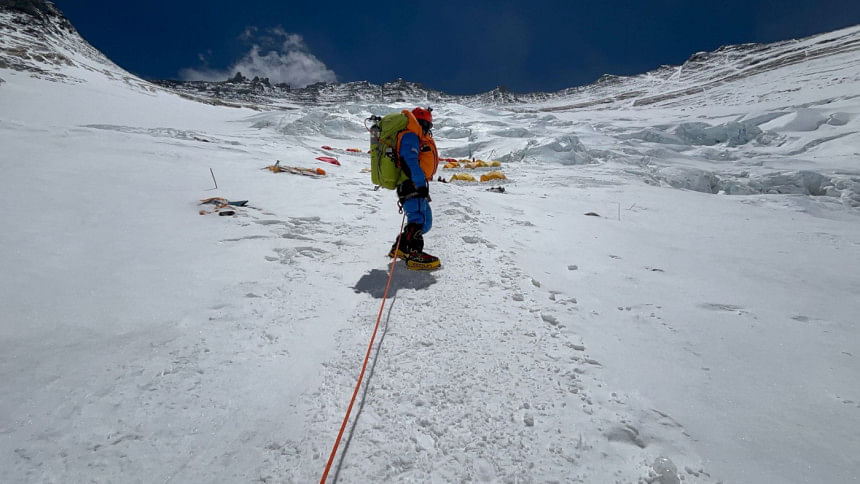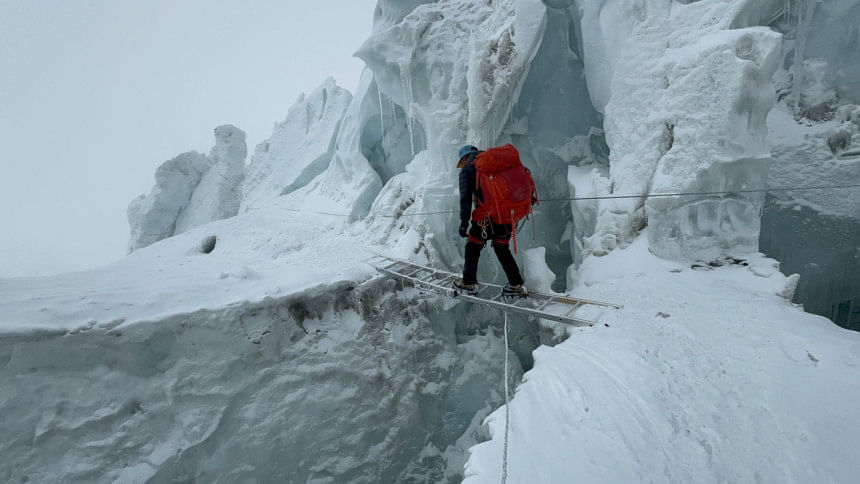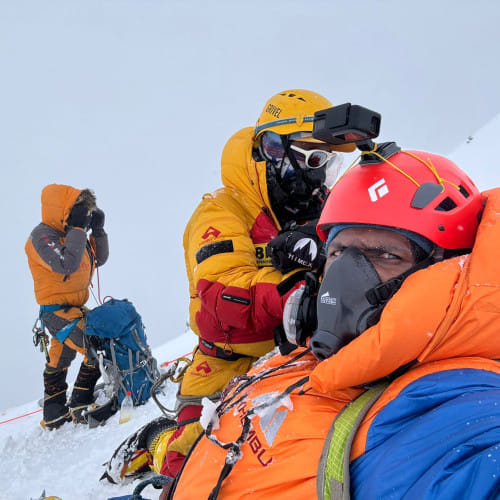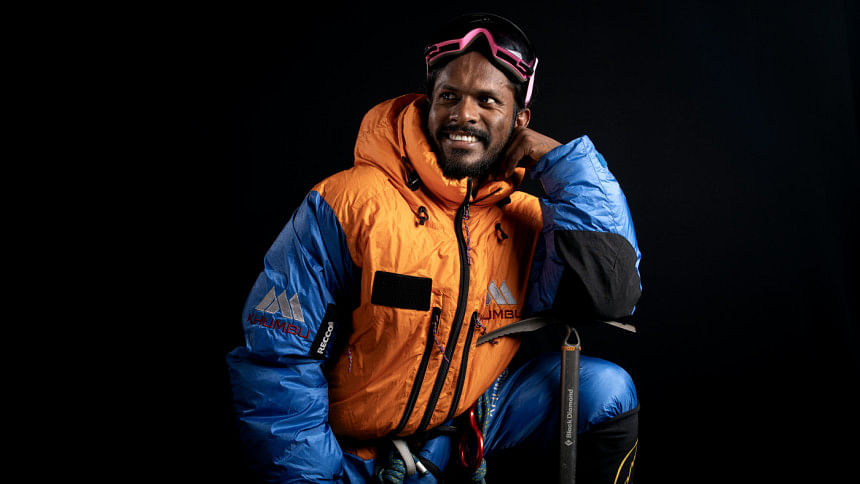Like many, Ikramul Hasan Shakil has also assumed many roles. When asked to introduce himself, he first mentioned his involvement with the United Nations Development Programme (UNDP) as a youth advocate to raise awareness about the perils of plastic pollution and then, expanded on his literary journey as an author of eight books. Yet, Shakil is best known as a mountaineer. But to describe him as just that is a disservice to the insurmountable feats he has gone on to conquer. His latest expedition perhaps best encapsulates his fervency. An adventure of epic proportions that has only been repeated once before by Australian mountaineer Tim Macartney-Snape, it is a feat that has propelled Shakil into the status of a national hero and etched his name in history.

The "Sea to Summit" expedition is distinct in that he climbed atop Mount Everest having begun his journey from Inani Beach at Cox's Bazar. Covering approximately 1,400 kilometres on foot and swimming across the Jamuna River, Shakil's journey was not merely a test of perseverance; it is a testament to the indomitable spirit of the human psyche.
We sat down with Shakil to have him elaborate on his journey, flesh out his message against plastic pollution, and discuss the support required to push mountaineering forward.
"While the entire expedition took me 84 days to complete, it took me 64 days to reach the base camp, from where I began the climb. To get to the basecamp, I had to swim across the Jamuna River because I was not granted permission to walk on the Jamuna Bridge, despite trying till the very last minute," said Shakil.
"I went from Banglabanda to Phulbari, where I spent a night at a friend's place. The next day I began my journey again and eventually arrived at Panitanki, near the India-Nepal border. I couldn't immediately cross the border then as it had gotten pretty late when I arrived there. So, I stayed at Naxalbari at the home of an auto-rickshaw driver. They were really welcoming and accepted me as one of their own," he said. "The auto-rickshaw driver's wife treated me like her own son. When I left their place, she kept telling me that I have my mother's blessing, referring to herself."

After crossing eight districts in Nepal, Shakil finally arrived at the Everest base camp on April 29, where his main journey began. He set out on his expedition on May 6 late into the night and made his way to Khumbu Icefall, which he referred to as one of the most challenging places on Mount Everest.
Nonetheless, Shakil made his way past the region, advancing through the first and second camps and onto the third, from where he descended back to the previous camp. "We have to let our body adjust the higher we climb," he explained. "After going back to the second camp, we descended even further back to the base camp. Because I had exposed myself to the atmosphere at an altitude of 7,000 metres, my body had somewhat acclimated to it."
On May 15, Shakil, along with his Sherpa guide, advanced directly towards the second camp again, from where they progressed to the third camp. Before the break of dawn, on May 18, Shakil marched towards the fourth camp.
"It was right before camp four that we first saw a corpse right after crossing Lhotse. I recognised the body. It belonged to a mountaineer I had spent time with at the base camp. It shook me," Shakil said.
Although Shakil had made commendable progress by then, the journey was far from over as he had to overcome more obstacles, notably, the harsh and unpredictable weather. Shakil recalled running into people who had left for the expedition before they did, climbing back down due to the harsh weather. Others who were advancing with them also began retreating.

"At a certain point, I got a little scared. Right around South Summit, the weather got really bad to the point where you couldn't see anything due to the whiteout. Not only was it very windy but there was also snowfall. I began to doubt whether or not I could even make it to the top," he recollected.
However, Shakil knew he had to persevere with whatever willpower he had left. "I had carried the Bangladeshi flag with me all the way from Inani Beach. I had to hoist it up at the peak," he asserted. Even then, a barrage of hurdles awaited him — a rope crossing at Hillary Step, the uncertainty that it imposed, and yet another reminder of what was at stake: survival.
"There was only one of two options then: either I make it to the top or die trying," he said.
Against all odds, however, Shakil made history. He made it to the summit. What awaited, even at the peak, was frostbite on his hand and snow blindness. Shakil knew he didn't have a moment to spare; he had to descend quickly. It wasn't until he made it back to the base camp that it occurred to him the incredible feat he achieved.
"Everyone asks me how I felt at the summit but the answer still evades me," he said. "This is what I fought so much for. I made it to the top of the world. I felt like the king of the world."
While Shakil's expedition in itself is exemplary, its significance is reinforced by the message at the heart of it. Through the journey, he sought to raise awareness about plastic pollution, the effects of which he encountered throughout.

"As I walked the entire path, I wanted to point out that the volume of plastic we see strewn everywhere can be curbed if each one of us spared a second not to dispose of it just anywhere. And that starts with being aware," Shakil affirmed.
"My primary goal is to remind everyone that if I can walk all the way to the summit of Mount Everest, why can't we all be a little more mindful about disposing of plastic?" he asks.
Our conversation then focused on what measures he took, both physically and mentally, to prepare for the expedition. He emphasised that mountaineering as a sport might just require more mental strength than mere physicality. "To be able to maintain composure under harsh conditions, which is constant throughout any of our expeditions, is a requirement," Shakil said. Additionally, he also trains regularly, with his routine consisting of running, free hand exercises, and being mindful about his diet.
Shakil also discussed the many challenges he faced before undertaking the expedition. "One of the biggest challenges I faced was sponsorship. My journey was a costly one, and securing adequate financial support proved to be difficult," he lamented.
Shakil also had to overcome hurdles in terms of visa processing. "When I applied for the SAARC visa, I was rejected four times," he said. "I had to wait till the last minute to get it. I might have gotten the visa but others might not be able to get it. What about them? If we do not receive support from government institutions, it becomes difficult for us to represent our nation."
Shakil consistently underpinned the significance of institutional support for mountaineers as it is a sport that not only requires them to travel abroad but also demands economic assistance. Thus, he urged all establishments to extend their support to mountaineers and the sport.

One other thing that he sought to bring attention to is the beauty of Bangladesh and the potential it has to become a hub for tourism. Despite the serenity that spans throughout the nation, the mountaineer believes we are unable to leverage it.
"I wanted to divert more attention towards Cox's Bazar through my expedition. If anyone seeks to find out where I started my journey from, they will be directed there, which could translate to genuine interest," he elaborated. "I wanted to be a global ambassador on behalf of my country and the youth."
To conclude, Shakil iterated that there is a distinct Mount Everest we all seek to conquer and we mustn't forego these dreams even in the face of adversity. As for mountaineering itself, he stressed the risks involved with the sport which is why anyone who intends to pursue it must do so with a degree of vigilance, intention, and a well-thought-out plan.
"It is usually a life-or-death situation. We unfortunately witness deaths all the time in this sport. Thus, one must prepare themselves mentally to become a mountaineer, undertake training, and not jump right into it. My advice to the youth is to stick to a plan," he concluded.









Comments